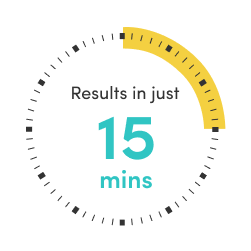TSH Testing: Your First Step in Detecting Thyroid Imbalances

Did you know? An underactive thyroid happens more in women than men. In the UK it affects 15 in 1000 women and 1 in 1000 men. Monitoring thyroid function for energy, mood and wellness is crucial.
Your Thyroid, Your Energy—Stay in Control
Schedule Your Thyroid Function Test Today!Book Your Test Now at only £49.00

Why Should You Take theTSH Test?
Testing Thyroid-Stimulating Hormone (TSH) levels is essential for understanding your thyroid function and overall health. The thyroid gland plays a critical role in regulating metabolism, energy levels, and hormonal balance. A TSH test can identify thyroid problems early for prompt intervention and management. And here's why this test is important:
Diagnose Thyroid Conditions:
Detect hyperthyroidism (extra thyroid hormone) or hypothyroidism (insufficient thyroid hormone) for fatigue, weight changes and mood disturbances.
Monitor Hormone Therapy:
Routine TSH tests help prescription thyroid medication users get the right dose of the hormone.
Evaluate Post-Treatment Levels:
Monitor thyroid hormone levels after hyperthyroidism treatment to ensure the thyroid gland is working properly or hormone replacement therapy is working.
Prevent Complications:
Finding and managing thyroid disorders early may prevent cardiovascular problems, infertility and serious metabolic imbalances.

Symptoms Indicating theNeed for a TSH Test
The Thyroid-Stimulating Hormone (TSH) test can reveal hyperthyroidism (overactive thyroid) or hypothyroidism (underactive thyroid). These affect several bodily functions and health. Watch for these symptoms:
Fatigue or Unusual Energy Changes
Hypothyroidism: Tiredness persists despite adequate rest.
Hyperthyroidism: Overactive metabolic process makes you feel drained.
Weight Fluctuations
Weight Gain: Unexplained increases - common with hypothyroidism.
Weight Loss: Despite Increased appetite - often due to hyperthyroidism.
Sensitivity to Temperature
Cold Sensitivity: Hypothyroidism causes more frequent cold sensations.
Heat Sensitivity:Hyperthyroidism causes excessive sweating or discomfort in warmth.
Mood and Cognitive Changes
Hypothyroidism: Either depression, mood swings or brain fog.
Hyperthyroidism:Nervousness, irritability or trouble focusing.
Irregular Heartbeat or Palpitations
A rapid or irregular heartbeat may indicate hyperthyroidism, while hypothyroidism causes A slower heart rate.
Skin, Hair, and Digestive Issues
Hypothyroidism: Dry skin, thinning hair, and constipation.
Hyperthyroidism: Sweating, thinning hair, and frequent bowel movements or diarrhea.
Changes in Reproductive Health
Women: Heavy/regular periods & fertility problems (hypothyroidism).
Goiter: Visible neck swelling may indicate thyroid dysfunction.
How and What We Measure
The TSH test measures the level of thyroid-stimulating hormone (TSH) in your blood to assess how well your thyroid is functioning. TSH is produced by the pituitary gland and signals your thyroid to produce the necessary hormones to regulate metabolism, energy levels and other bodily functions. It is very important in diagnosing overactive or hypothyroidism (underactive thyroid) conditions.
TSH serves as a vital marker for the relationship between your brain and thyroid gland. When the thyroid doesn't produce sufficient hormones, TSH increases to compensate, indicating hypothyroidism. On the flip side, increased TSH levels suggest that your thyroid is more than producing hormones - you have hypothyroidism. This delicate balance makes T SH a crucial tool for the detection and management of thyroid issues.
- 1
You need not prepare anything special. Eat, drink and take your medications normally before the test.
- 2
- 3
- 4
- 5
- 6
Stay on Top of Your Thyroid Health-Take Charge Today

Understanding Your TSHTest Results
| TSH Level (mU/L) | TSH Level (μIU/mL) | What It Means for Your Health |
Less than 0.4 mU/L | Less than 0.4 μIU/mL | Low levels -Indicates hyperthyroidism (overactive thyroid). Symptoms may include weight loss, rapid heartbeat, and anxiety. Consult a healthcare provider for further evaluation. Retest as advised. |
0.4 to 4.0 mU/L | 0.4 to 4.0 μIU/mL | Normal Levels -Indicates a healthy functioning thyroid gland. No immediate action needed. Retest annually or as advised. |
More than 4.0 mU/L | More than 4.0 μIU/mL | High Levels -Indicates hypothyroidism (underactive thyroid). Symptoms may include fatigue, weight gain, and depression. Requires medical evaluation and possible treatment. Retest in 3-6 months or as advised. |
